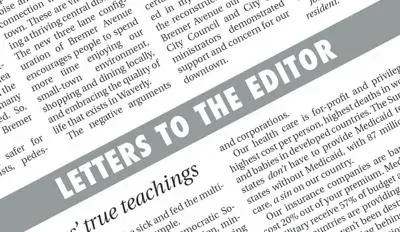
The last, the least and the lost are an amalgamation of verses found in the book of Matthew in the New Testament of the Holy Bible.
- The Last: “So the last will be first, and the first will be last.” (Matthew 20:16, NIV)
- The Least: “The king will reply, ‘Truly I tell you, whatever you did for one of the least of these brothers and sisters of mine, you did for me.’” (Matthew 25:40, NIV)
- The Lost: “For the Son of Man came to seek and save the lost.” (Matthew 18:11, NIV)
When I began researching and writing this column, I realized that Jesus was responding to his disciples, who had come to him asking, “who will be greatest in the Kingdom?” Or, in current, everyday language, “Who’s going to be number one around here?” The question I was attempting to answer in my mind and to share with my readers, is how did Jesus actually go about loving people?

First, Jesus often associated with the common folk. In my Scripture reading I was reminded that Jesus was homeless during the time of his earthly ministry. “Foxes have dens and birds have nests, but I, the Messiah, have no home of my own ... no place to lay my head.” (Matthew 8:20, LNT)
This was not the “good news” the disciples wanted to hear. They were still trying to figure out who would be “first” in the Kingdom.
Rather than spend his time with the elite or wealthy, Jesus spent time with the “last, the least and the lost of society; including tax collectors, (Matthew was a tax collector,) prostitutes and the poor. If Jesus was walking among us today, I have no doubt he would spend much of his time volunteering in the community, healing the broken heartened and sharing the “good news” of the Gospel.
Second, Jesus sets an example for us by slowing down and actually taking the time to minister to people. He teaches us to do the same. “Do to others what you would have them do to you ..." ( Matthew 7:12, LNT)
Jesus instructs us through this command, to ask folks in need: “What can I do for you?” We often like to take control by telling people what we can, and will do for them; even though they haven't shared a specific need.
Third, we often make excuses when challenged to serve. Sometimes compassion fights against stubbornness. Helping could be dangerous; what if a person takes advantage of us? Is this going to cost more than I want to give? These examples can cause us to lose our focus and control, even though deep down in our soul we know what the Lord would have us do. He urgently wants us do what he’s been commanding from the beginning: “Love your neighbor, as yourself.”
Sentinel Leach is a reader-supported publication. To receive new posts and support my work, consider becoming a free or paid subscriber.
Finally, I (we) personally must realize that even though our creator “has the whole world in his hands,” I am just one person. However, if I can help at least one person, it is worth the effort.
Thank God I am free to serve! I pray for the opportunity ... and the strength to make it happen. I invite you to join me.
— Dan Van Ommen is a Zeeland resident and a member of the Reformed Church in America. Contact him at dan.vanommen@gmail.com.



